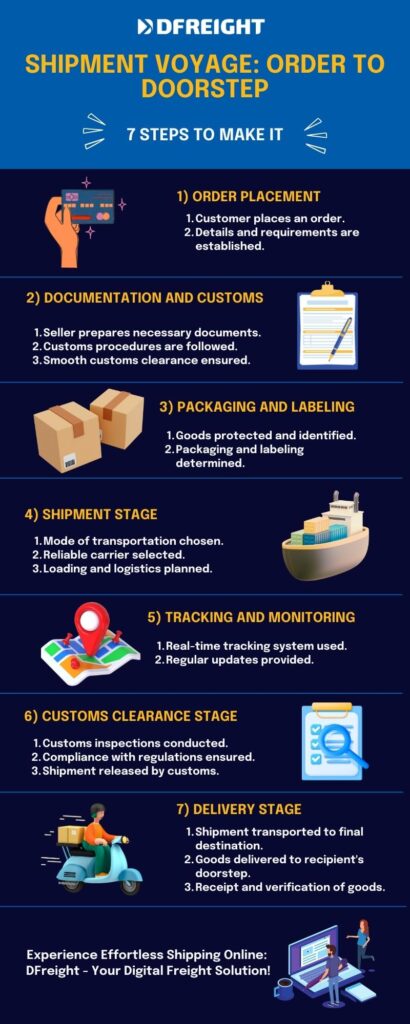Freight transportation is a crucial aspect of global trade, and understanding freight terms is essential for both shippers and carriers. In this comprehensive guide, we will delve into the world of freight terms, their significance, and how they impact the shipping and logistics industry.
Ready to simplify your freight forwarding experience? Try DFreight, your digital freight forwarder. Streamline your shipments, access real-time tracking, and enjoy hassle-free logistics. Sign up today and experience the future of freight management.
Table of Contents
Key Players in Freight Transportation

Key players in freight transportation encompass a diverse range of stakeholders, but two key entities at the forefront are shippers and carriers. Shippers, often businesses or individuals, are the originators of freight, responsible for packaging and preparing goods for transport. They play a vital role in coordinating the movement of goods and ensuring they reach their intended destinations.
On the other hand, carriers, including trucking companies, shipping lines, and airlines, are the transportation providers entrusted with the physical delivery of freight. They operate the necessary infrastructure, such as trucks, ships, and planes, and handle the logistics to move goods efficiently and securely. Shippers and carriers form a dynamic partnership, working together to facilitate the smooth flow of goods across various transportation modes and supply chains, playing an integral role in the global economy.
The world of shipping is a complex and fascinating domain that connects businesses and individuals across the globe. Whether it’s transporting goods or delivering packages, understanding the various stages and key elements involved in the shipping process is crucial. This informative infographic unravels the intricacies of shipping, providing a comprehensive overview of the stages and essential elements that make it all possible.
Unlocking the Language of Freight Forwarding: Essential 25 Terms You Should Know
Understanding common freight terms is crucial for effective communication and negotiation. Here are some freight terms you need to know:
- Freight Forwarding: The process of organizing and coordinating the shipment of goods from one location to another.
- Shipment: The consignment of goods that are transported from one place to another.
- Logistics: The management of the flow of goods, information, and resources from the point of origin to the point of consumption.
- Carrier: The company or individual responsible for transporting the goods, such as a shipping line, airline, or trucking company.
- Customs Broker: An individual or firm that assists in the customs clearance process, ensuring compliance with import and export regulations.
- Incoterms: International Commercial Terms that define the rights and obligations of the buyer and seller in international trade, including responsibilities for transportation and insurance.
- Bill of Lading (B/L): A document issued by the carrier as a receipt of goods and a contract of carriage.
- Freight Forwarder: A company or individual that organizes and coordinates the transportation of goods on behalf of the shipper.
- Cargo Insurance: Insurance coverage that protects against loss or damage to goods during transportation.
- Export Documentation: The paperwork required for exporting goods, including invoices, packing lists, and export licenses.
- Import Documentation: The paperwork required for importing goods, including customs declarations, permits, and licenses.
- Customs Clearance: The process of getting goods through customs, including the submission of necessary documents and payment of duties and taxes.
- Warehousing: The storage of goods in a warehouse facility before or after transportation.
- Packaging and Labeling: The preparation of goods for transportation, including proper packaging and labeling for identification and handling.
- Freight Rate: The price charged for the transportation of goods from one location to another.
- Consolidation: The process of combining multiple shipments into a single shipment to achieve cost savings and efficiency.
- Deconsolidation: The process of breaking down a consolidated shipment into individual shipments upon arrival at the destination.
- Freight Forwarding Network: A network of freight forwarders and logistics providers that collaborate to offer global coverage and services.
- Last Mile Delivery: The final stage of the delivery process, from the transportation hub to the ultimate destination.
- Dangerous Goods: Goods that are hazardous or pose a risk to health, safety, property, or the environment during transportation.
- Transshipment: The transfer of goods from one transportation mode to another or from one carrier to another during the journey.
- Inland Transportation: The movement of goods within a country, usually by road, rail, or inland waterways, to and from ports or airports.
- Documentation Services: The provision of document preparation and verification services for international trade transactions.
- Export Compliance: The adherence to laws, regulations, and policies governing the export of goods, including trade sanctions and export controls.
- Supply Chain Management: The coordination and management of all activities involved in the production and delivery of goods, from raw materials to the end consumer.
To further enhance your understanding of freight forwarding and delve deeper into the terminology associated with this field, we invite you to explore our comprehensive glossary. This glossary provides a wealth of knowledge on various terms, concepts, and processes related to freight forwarding, logistics, and international trade.
Choosing the Right Freight Terms for Your Business
In today’s globalized and interconnected world, businesses of all sizes rely heavily on efficient and reliable transportation of goods. Whether you are a small e-commerce startup or a multinational corporation, selecting the right freight terms is crucial for the success and profitability of your business. Freight terms determine the allocation of responsibilities and costs between the buyer and seller during the transportation process. Making informed decisions about freight terms can lead to streamlined logistics, improved customer satisfaction, and ultimately, a competitive advantage in the market.
- One of the key factors to consider when choosing freight terms is the mode of transportation. Different modes, such as air, sea, road, or rail, come with their own set of advantages and limitations. For instance, air freight offers speed and reliability but can be expensive, while sea freight is more cost-effective for bulky or large-scale shipments but has longer transit times. By assessing your business needs, product characteristics, and customer expectations, you can determine the most suitable mode of transportation and select appropriate freight terms accordingly.
- Another crucial aspect is the allocation of risks and liabilities. Freight terms, such as Incoterms, clearly define the point at which the responsibility for goods transfers from the seller to the buyer. For instance, under Ex-Works (EXW) terms, the buyer assumes full responsibility for the goods from the seller’s premises, while under Delivered Duty Paid (DDP) terms, the seller is responsible for delivering the goods to the buyer’s specified location. Evaluating the level of risk you are willing to assume and your ability to handle certain logistics tasks will help you decide on the most appropriate freight terms for your business.
- Cost considerations also play a significant role in selecting freight terms. It is essential to assess the impact of freight costs on your overall supply chain expenses and profit margins. Some freight terms, such as Free on Board (FOB) or Cost, Insurance, and Freight (CIF), include transportation costs in the purchase price, whereas others, like Cost and Freight (CFR) or Ex-Works (EXW), require the buyer to bear transportation expenses separately. By understanding your budget constraints and the competitiveness of your industry, you can make informed decisions that strike a balance between cost-effectiveness and service quality.
- Furthermore, the geographic scope of your business operations must be taken into account when choosing freight terms. If your business involves international trade, you need to consider customs regulations, import/export requirements, and the complexities associated with cross-border logistics. Freight terms that facilitate smooth customs clearance, such as Delivery Duty Paid (DDP) or Delivered at Place (DAP), can help you navigate international trade barriers effectively. On the other hand, terms like Free Carrier (FCA) or Free Alongside Ship (FAS) may be more suitable for domestic operations.
- Lastly, it is crucial to stay updated with industry trends and changes in logistics practices. The freight industry is constantly evolving, with new technologies, regulations, and market dynamics shaping the way goods are transported. By keeping a close eye on emerging trends and leveraging technology-driven solutions, such as track-and-trace systems, real-time visibility, or digital freight platforms like DFreight, you can optimize your supply chain, enhance operational efficiency, and offer a superior customer experience.
In conclusion, choosing the right freight terms for your business is a critical decision that can significantly impact your bottom line and overall competitiveness. Taking a strategic approach to freight terms selection will not only streamline your logistics operations but also position your business for growth and success in the dynamic global marketplace.
In Closing
Understanding freight terms is crucial for shippers and carriers alike. By comprehending the various aspects of freight transportation, including documentation, pricing, insurance, and specialized services, businesses can streamline their operations and make informed decisions. Stay informed and up-to-date on freight terms to navigate the complex world of logistics successfully.
What are freight terms and why are they important in shipping and logistics?
Freight terms are conditions and agreements between the buyer and seller for transporting goods. They are important for ensuring smooth logistics operations and clarifying responsibilities.
What are the most common freight terms used in international trade?
The most common freight terms in international trade are Incoterms, which define buyer and seller responsibilities. Examples include EXW, FOB, CIF, and DAP.
How do freight terms impact shipping costs?
Freight terms directly impact shipping costs by determining who pays for transportation, insurance, and other charges associated with the shipment.
What is the difference between “prepaid” and “collect” freight terms?
“Prepaid” means the seller pays upfront, while “collect” means the buyer pays upon delivery for the freight charges.
Are there any risks associated with freight terms?
Yes, unclear terms can lead to disputes. Some terms transfer the risk of loss or damage. It’s important to review and understand the terms to mitigate risks.














